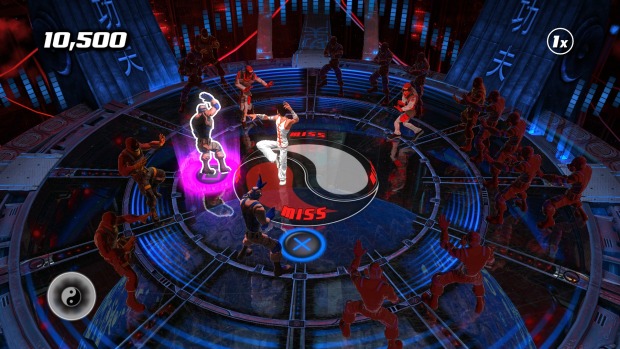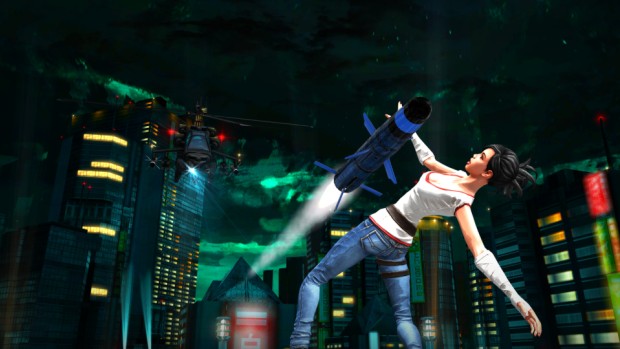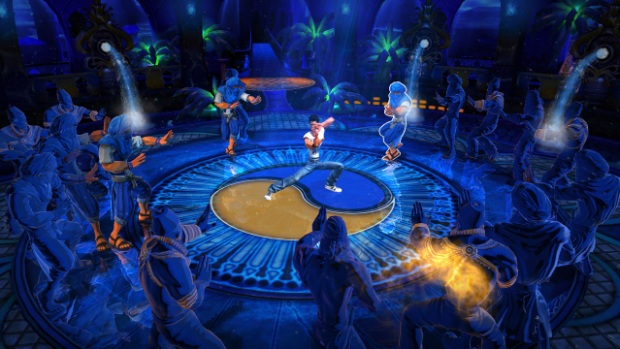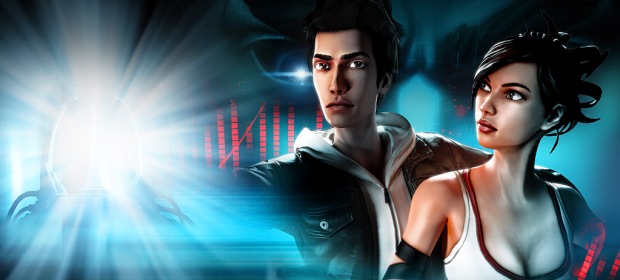Rhythm-action isn’t a terribly complex genre. Taking the most basic essence of videogames – the button press – and distilling it so thoroughly that it becomes engaging enough to form a game in its own right is no mean feat, but the product of said refining is always going to be a little one-note. And if you’re a one trick pony, that trick has to be bloody good.
Guitar Hero is rightly lauded because it got this theory spot on. Meeting the prompts had a tangible reward, missing them a clear punishment in the form of the bum-note in the middle of your favourite riff. Kickbeat though… well, Kickbeat doesn’t do any of this.

Transplant the chords from Guitar Hero’s instrument to the face buttons on your gamepad and the special power to L1. Instead of hitting scrolling notes as a rock-god, you’re now beating up goons as they approach from the compass points around protagonist Lee, all in time to music. Concept-wise it isn’t hard to grasp.
The backdrop for this is straight-to-DVD stuff. All of the music on Earth – housed in the ‘Music Sphere’ – has been stolen from the monastery of its caretaker monks. As a young Kung-Fu apprentice, it is up to you to get it back, fighting across a selection of songs that have been left behind in a handful of environments with four or five cutscenes fleshing out the narrative. It’s not a bad story, but there isn’t much there – aside from a Bieber gag that is so out of place with Kickbeat’s target audience it’s almost funny.
Enemies approach 90 degrees anti-clockwise from where they will attack you, allowing for a bit of forward-planning while keeping your view focused on the action, with Lee striking out in the direction you send him. Colour coding helps sort your rhythm, with Yellow grunts filing in one at a time, Blues striking in couples or triplets on alternate half-beats and Reds attacking in pairs.

Perfect hits build your Chi meter – which when unleashed adds points to your score – whilst your life will drop if you are hit too many times. Bonuses are also available from some enemies, either points or a health boost, claimed by double tapping the relevant face button when they attack.
It really is all very basic, and as such it should be tight as a drum – especially when you consider that this is a port of last year’s PS3 and Vita release. Kickbeat is not tight. For this genre, every successful button press should feel like a triumph. Instead you miss most of the action, focused as you are on the periphery rather than what Lee is doing: there’s no reward. Even worse is when you do spare a glance, you realise that his punches don’t always connect, and his kicks are just off.
Kickbeat’s cardinal sin, though, is that it doesn’t always get the rhythm right. Where Guitar Hero covers you when you’re a fraction late, here Lee isn’t tuned to the music, but to you. Press a fraction late, he’ll react a fraction late. It’s good in a sense that there’s generous timing, but it feels wrong.

Similarly wrong is the scroll in of your attackers. Coming from the left of the button needed to strike them, they approach in a perfect curve, before taking a tiny shuffle forward into the attack box. You’ll learn to adjust, but that direction change breaks the flow more than you’d imagine. It can also be a pain to work out what colour an enemy is on some of the stages – particularly the earlier ones – as they blend into the neon backgrounds, and the shaky camera zooming in and out of the action only makes things more frustrating, rather than harder.
Graphically, Kickbeat looks quite pretty, even if enemies are identikit clones, but some in-engine close-ups are dominated by muddy textures that you just don’t expect on this generation. With only 24 tracks (highlights include Pendulum and Marilyn Manson) there’s not much here in the way of longevity. Harder difficulties and a survival mode might interest you, but only if the track list as a whole grabs your attention. Sadly, the music importer of the Steam release isn’t included.
Kickbeat is a fairly generic rhythm-action title, hampered by loose core gameplay – something that really needed to be solid when there is so little in the way of content. It’s hard to recommend it when there are better examples of the genre out there.

AVERAGE. The epitome of a 50/50 game, this title will be unspectacular but inoffensive, charmless but amiable. We aren’t condemning a game by scoring it a 5, but we certainly aren’t championing it, either.
Review code provided by publisher.





